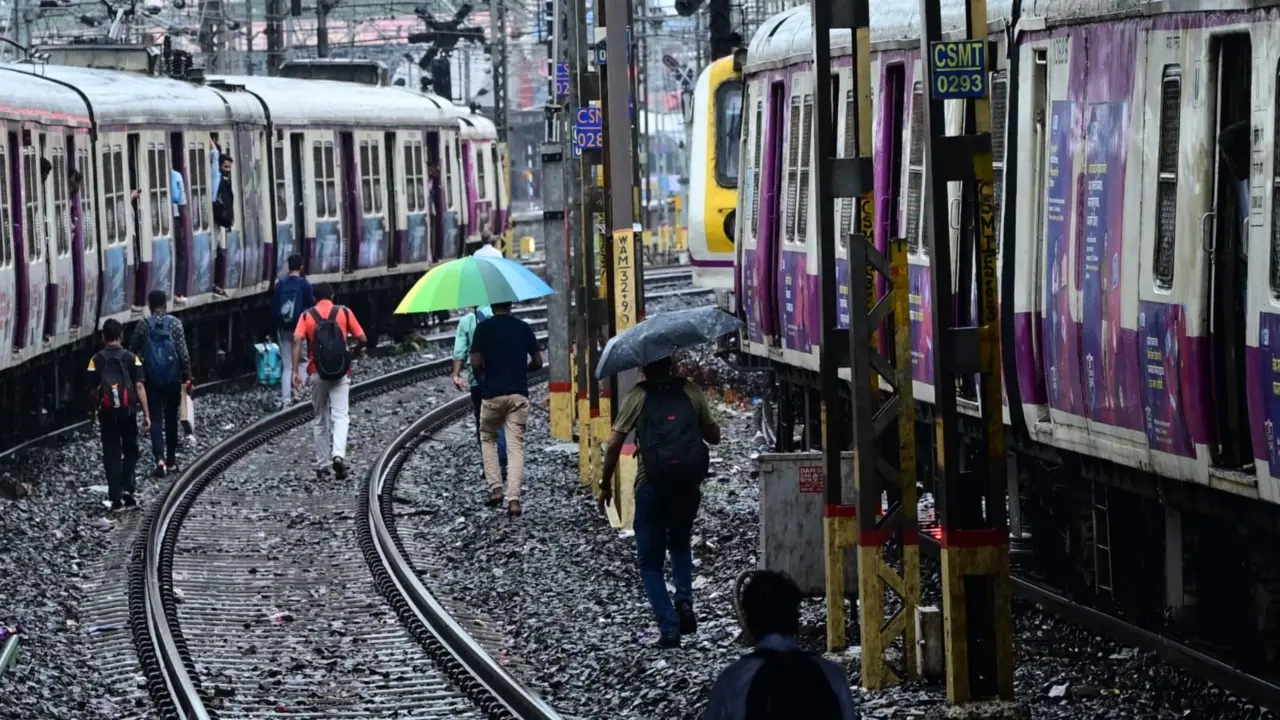Heavy rains combined with technical faults threw Mumbai’s suburban rail network into disarray on Thursday, severely impacting the mobility of lakhs of daily commuters. With both Central and Western Railway lines facing operational setbacks throughout the day, the financial capital was gripped by frustrating delays, overcrowded platforms, and train cancellations.
The disruptions began early in the day as monsoon showers intensified across the city, leading to reduced visibility and waterlogging on key stretches of track. According to railway officials, early morning delays ranged between 15 and 20 minutes. The cascading impact grew through the day, culminating in technical failures that paralysed services during crucial peak hours. A significant incident occurred on the Western Railway network around 1:25 pm when a signal failure near Andheri station halted services in both directions. A locomotive came to a standstill on the track, further compounding delays and sparking a ripple effect across the suburban corridor. Although the issue was rectified within 20 minutes, officials confirmed that at least six scheduled services had to be cancelled, while several others were running severely behind schedule.
The Central Railway was not spared. Around 3:45 pm, a Titwala-CSMT suburban train reported a pantograph malfunction near Kanjurmarg, stalling the service for nearly 25 minutes. The train resumed its journey at 4:13 pm, but the operational impact was immediate. Trains on both the slow and fast corridors of the Central line suffered delays ranging from 10 to over 50 minutes. Railway control rooms attempted to play down the disruption, estimating average delays at 8 to 12 minutes. However, ground reports told a different story. Several passengers reported delays extending well beyond 30 minutes. For instance, a local scheduled to leave CSMT at 5:19 pm arrived at Titwala more than 50 minutes late. Similarly, another fast train from CSMT to Ambernath, scheduled for 5:41 pm, reached its destination over 40 minutes behind time.
Even premium air-conditioned locals, introduced as part of the railways’ effort to enhance commuter experience, could not escape the monsoon impact. A 5:00 pm CSMT-Ambernath AC local train faced delays, adding to commuter grievances and crowding at stations along the route. With minimal alternative arrangements in place, stranded commuters bore the brunt of long waiting times, uncertain schedules, and inadequate public communication. Crowd control became increasingly difficult as peak-hour footfall surged at major interchange points such as Thane, Dadar, Kurla, and Andheri. Public announcement systems relayed updates on cancellations and delays, but commuters complained of limited clarity and little assistance on alternatives. On several platforms, passengers were seen waiting with no indication of when the next train would arrive.
Officials from both Central and Western Railway zones acknowledged the complications but maintained that monsoon-related disruptions are an annual challenge due to the ageing infrastructure and high-density schedules of the Mumbai suburban network. “We are deploying emergency response teams and maintenance personnel to address issues promptly, but the volume of traffic and environmental variables limit our turnaround time,” said a senior railway official. Mumbai’s suburban railway system, often described as the city’s lifeline, carries more than 75 lakh passengers daily. With each passing monsoon, however, its structural vulnerabilities become increasingly evident. In recent years, waterlogging, signal failures, and equipment malfunctions during rains have become frequent, underscoring the need for resilient transport infrastructure.
Experts in urban mobility and transport infrastructure argue that long-term planning remains insufficient. “There’s a need for systemic upgrades — from drainage along the tracks to smart signalling systems that can function in adverse weather,” said a transport infrastructure analyst. “Unless climate-resilient upgrades are prioritised, these disruptions will continue to compound annually.” The broader civic ecosystem also adds pressure. Inadequate stormwater drainage near tracks, unauthorised structures choking catchment areas, and encroachments along rail corridors continue to amplify the impact of heavy rainfall. Railway authorities have repeatedly raised concerns about external civic limitations hampering their own capacity to deliver uninterrupted services.
Passengers, meanwhile, are left to navigate the chaos with little support. The absence of a robust multimodal integration system leaves few reliable alternatives when the railways falter. While metro lines and buses provide some relief, they are yet to match the scale and speed of the suburban rail network. As Mumbai continues to witness a more intense and erratic monsoon pattern, the urgency of transport modernisation and disaster preparedness has become a pressing concern. Although officials claim remedial steps are underway — including improved track maintenance, enhanced electrical systems, and weather monitoring tools — the tangible impact on commuter experience remains marginal.
From a sustainability perspective, experts also emphasise the role of a well-functioning public transit system in reducing the city’s overall carbon footprint. Every disruption pushes commuters towards private or para-transit options, increasing fuel consumption and vehicular congestion. Thursday’s disruption serves as yet another reminder of the need for urgent investment, planning, and inter-agency coordination to build a climate-resilient, commuter-centric suburban rail system. As Mumbai aspires to become a future-ready metropolis, its lifeline must be strengthened not just to carry passengers efficiently but also to do so sustainably.
Also Read : Chennai Faces Flood Risk as Adyar Is Blocked


